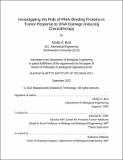Investigating the Role of RNA-Binding Proteins in Tumor Response to DNA Damage-Inducing Chemotherapy
Author(s)
Bird, Molly A.
DownloadThesis PDF (6.539Mb)
Advisor
Yaffe, Michael B.
Terms of use
Metadata
Show full item recordAbstract
Despite immense progress in the biological understanding and treatment of cancer over the past several decades, cancer remains a leading cause of mortality worldwide. Even with the emergence of molecularly-targeted therapies and immunotherapy, cytotoxic agents that induce DNA damage remain first-line drugs in the clinic. Unfortunately, the majority of patients will develop resistance to DNA-damaging chemotherapy and relapse. Recent studies indicate that RNA-binding proteins (RBPs) appear to play a particularly important role in cancer, and may contribute to chemoresistance, but the field is still at an early stage and nothing has yet progressed towards translational utility. This is at least partially due to a lack of systematic discovery tools and tractable human-relevant mouse models for in vivo screening. To address these challenges, we first created a computational platform, Transite, that systematically infers RBPs influencing gene expression through changes in RNA stability. As a proof of principle, we applied Transite to RNA expression data from cancer patients with naïve or chemoresistant tumors, identified several RBP regulators of the DNA damage response, and identified hnRNPC as a new modulator of chemotherapeutic resistance. Second, to enable the identification of new RBPs that affect chemosensitivity in high-grade serous ovarian carcinoma (HGSOC) we performed a targeted CRISPRi screen in vitro against 579 RBPs to identify those that cause sensitivity or resistance to cisplatin, oxaliplatin, paclitaxel, or olaparib. The screen implicated several known and novel RBPs in affecting sensitivity to chemotherapy in HGSOC, including the RNA-modifying enzyme ADAR1, which we subsequently validated. As an initial step towards in vivo testing and validation of the CRISPRi screen, we have devised methods to improve the engraftment and aggressiveness of an orthotopic HGSOC CRISPRi-functionalized xenograft mouse model. This involved serial in vivo transplantation studies to generate tumor and ascites-producing lines, several of which became more aggressive with subsequent passaging in mice. With further optimization, these lines can be used to enable in vivo screening of novel RBP targets that emerged from our in vitro CRISPRi screen. Taken together, the efforts described in this thesis serve as a critical resource to enable the identification of RBP-targeted combination chemotherapy treatments that could enhance therapeutic responses to anti-cancer therapy.
Date issued
2022-09Department
Massachusetts Institute of Technology. Department of Biological EngineeringPublisher
Massachusetts Institute of Technology